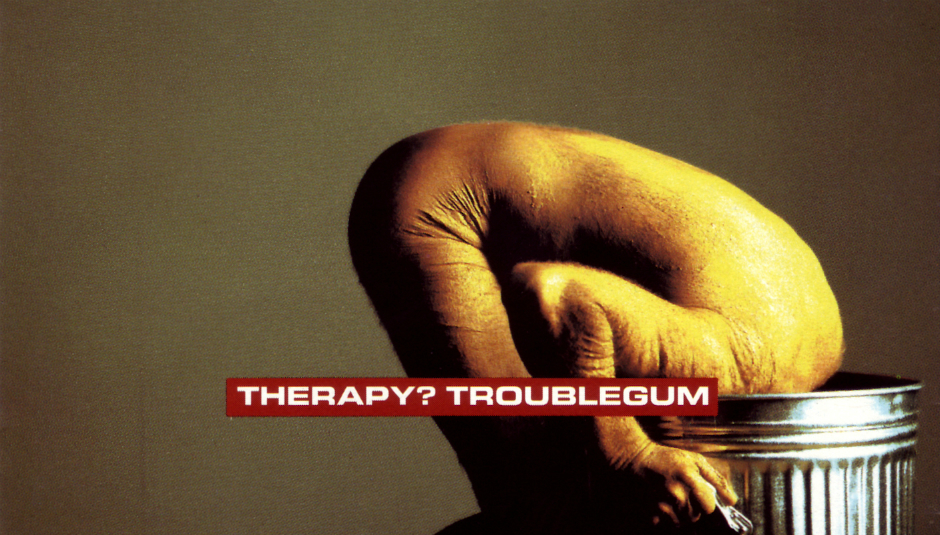I would have been six years old when the video for Therapy?'s 'Nowhere' appeared out of the ether on Irish children's television. It was a piece of work massively of its time in retrospect, but those few minutes burnt themselves onto my brain: frontman/guitarist Andy Cairns' bob-and-goatee combo unlike anything I'd seen before, the man tearing chunky riffage out of a Gibson SG in the midst of kaleidoscopic visual effects and moody footage of a young woman lost on uncaring, rundown streets. It was a moment that would stay in the back of my head as the wider cultural moments whizzed past my childhood: the Britpop wars, borrowing Prodigy bootlegs, a short-lived thing for French electronica, the grunge and thrash rites of passage, and even digging for Irish indie-rock footnotes like Mesner. It wasn't until my mid-teens, when a local electronics shop was clearing out dust-gathering cassette stock, that the multi-pronged attack of Troublegum revealed its spat-out, halfway-house glory at a time when the idea of "Irish bands" was just dawning on me, taking the boys in black out of the mothballs of my young mind and directly into the centre of my world.
Short, sharp stabs of power-chords punctuate 'Knives'' shit-eating humour: all manner of punk clichés are made fun of without falling into the realm of pantomime, while fleeting references to mental illness and confusion, touched upon in the band's previous and subsequent work, are almost poignant through contemporary eyes. Unfettered howling and a wailing, dissonant guitar break summarise the chaos and cartoonishness perfectly, before juddering to a halt. Possibly one of the greatest examples of timing across an LP follows: when listening front-to-back, you scarcely have time to take a breath before the big toms that count in 'Screamager' ring out. What follows is a feat of pop perfection comparable to The Undertones' 'Teenage Kicks', the immortal Ulster punk koan after which this was lovingly if skeweredly patterned - the self-loathing and psychodrama of the teenage condition summarised perfectly ("Your beauty makes me feel alone / I look inside but no-one's home"), propelled by squalling bass and a frankly heart-stopping snare that gallops into one of the mightiest hooks ever assembled in any genre of music, equal parts guitar-hero machismo and a preternatural knack for melody.
A one-two punch of sociopolitical commentary in 'Hellbelly' and 'Stop It, You're Killing Me' are also handy reference points for the stew of influences and sounds behind Troublegum; the former is a chugging broadside against the artifice of Christian fundamentalism of any stripe, evoking schoolchild nightmares ("Old, twisted and white / Dead crow on a fence is your style") and institutional fear of damnation in the process ("Fire! Fire! Fire! Hell"), the ultimate parent-upsetter in the context of the legacy of Ireland's piety, while the latter, a conscientious, teen-geared analysis of war and human suffering, is a shining example of indie-friendliness amid all the crunching and spitting, with a melodic break communicating the urgency and personal experience of refugees amid the crises of the time.
The personal and political are seldom separate on this record. Troublegum's teenage protagonist, the 'I' of Cairns' lyrics, is looking around him and relating the wider issues of the world to his own internal tumult, searching for a place in which to fit. He does not find it in the rural Ireland of the eighties recession, on which the alienation of 'Nowhere' is surely based. The wailing sirens of an RUC meat-wagon pass by via Cairns' weird, serrated lead guitar, cutting through a muscular major-key pop number with the distortion up and the cognitive dissonance turned up further; melodic as a lark, but dealing with small-town rot and the question of maturity ("Shouting at the world you'll never change / But it's what inside you've got to rearrange").
The emptiness that sometimes emerges from these transitional experiences and the wider grappling to be done with the inherent meaninglessness of life is also touched on in 'Die Laughing', moving with an oddly Fugazi-esque swing as it clambers through the thorny bushes of trust and the tying of one's identity to perception. 'Unbeliever' veers sometimes into Smiths-level self-pity, speaking frankly, if not a little dramatically, of one's confidence issues and the exposure to ideals and best selves that surround us to a hyper-real extent today, broken up by a mournful piece of guitar shredding by Helmet's Page Hamilton. 'Trigger Inside' teases the issue of self-confidence a tad further while continuing to eat from the table of shit-eating grins ("I know how Jeffrey Dahmer feels"), with some genuinely Wildheartian riffing on display throughout.
All of this noise, fury and self-hatred would be put down to the angst and hurt caused by the scars of adjusting to the toxic masculinity of a nearly bygone age and made for yet another good rock album of the time if it weren't for flashes of sophistication and intelligence with which Troublegum operates. Appealing alternately to latent common sense/emotional intelligence in the young mind, and its equal drive to violently lash out against its surroundings, songs like 'Lunacy Booth' lift Troublegum far and away above the rabble of '90s major-label material. Lesley Rankine of Silverfish chimes in on a massive song that plays on '80s indie sensibilities, balancing the religion-informed ideal of a 'perfect self' against the cold comfort offered by the pillars of theism. A cover of Joy Division's 'Isolation', recorded in the studio and included on the record, is a forceful proposition, filling out the original's sparse structure with ample, howling wounded guitars and brought forth by a scintillating drum line courtesy of ex-sticksman Fyfe Ewing.
The Fugazi/Dischord influences continue but lie low, within Bowie-referencing, B-movie-recalling 'Turn', equating the fear of the unknown with the new challenges of adolescence ("This is yours to take control, this is yours, now hold your own") in ghastly fashion, the mantra of 'barging into the presence of God' fixing the immutables and unmoveables of the world around one's self as insurmountable sources of unknowing. But in all the hurt, hatred, and angst of a record seemingly made from the brainwaves of any hormonal, truculent culchie metaller, possibly the album's sleeper is an unlikely male-feminist anthem. While dealing in slight triteness ('Femination/Generation' hasn't aged well), it does an exemplary job of hammering home the points and arguments behind feminism in a manner that punctures with prejudice the bluster and selfishness of the young male ("She's not trying to catch your eye / She's just trying to get a life") and questioning the idea of sex as a tool of conquest ("Do you want a fuck? / Do you want a friend?"). In modern context, it's mind-blowingly forward-thinking that these sentiments made it onto a record meant for an audience with zero such concerns at the time, a lash at the metal boys' club, and it's certainly as succinct an argument for male feminism as anything the likes of The Rubberbandits would be coming out with over twenty years later.
'Unrequited' continues refining the uncouth metal pallet with pulling, jerking strings in between impatient bursts of riffing. Toms roll deftly under fat cello chords, as mournful, higher strings hover ominously over the wait for the song's singular calling-card, a horrified realisation that love and affection don't bend to the will of the lover. 'Brainsaw' finishes the whole experience with a snarl that hides a bloodied mouth, ostensibly dealing with betrayal but hiding moments of rhythmic genius and even pearls of vague psych-rock tension shine underneath the squall.
I've written about the band an awful lot over the years for various places. This album has often been in my sights in various capacities: the benchmark of their commercial success against which far more mature and better-developed albums are unfairly compared, an unloved classic of the mainstream metal oeuvre, a punk album too heavy for the old punx and too weird for the studied over-earnestness of the grunge set, a ghost that haunted them as they reconfigured themselves time and again against the odds. But upon looking at this album on a strictly personal level, its effect on me and my life becomes evident; a trio of awkward, seething young fellas from the back-arse of nowhere broke out of it and took on the world, on their own terms. In a time before everyone was instantaneously connected, and everyone listened to everything, it was the most empowering thing an awkward, seething young fella from the back-arse of nowhere could have seen.
But it wasn't just about reactions, Troublegum hid an important lesson in the soles of its steel-toed boots: look around you, look outside of you, and only then, look within you.






















